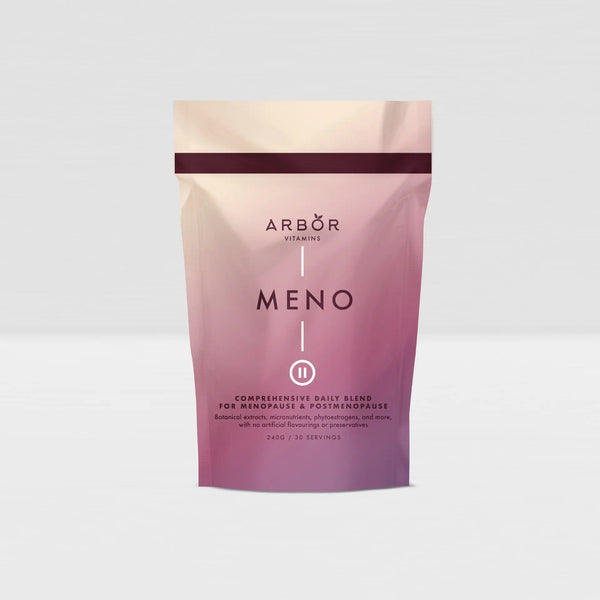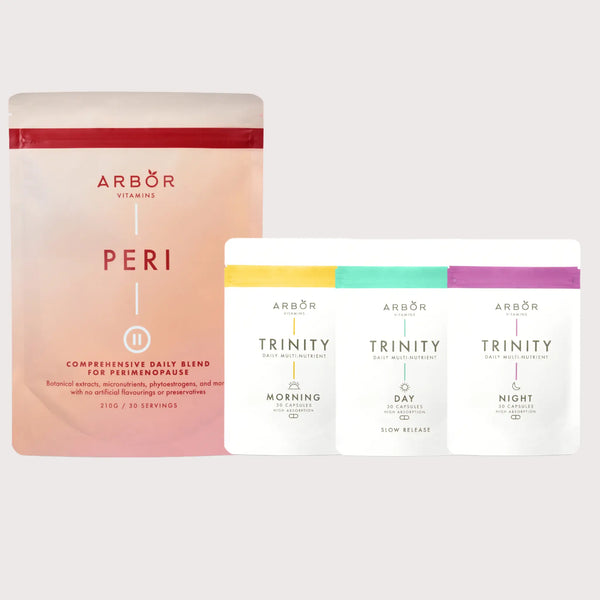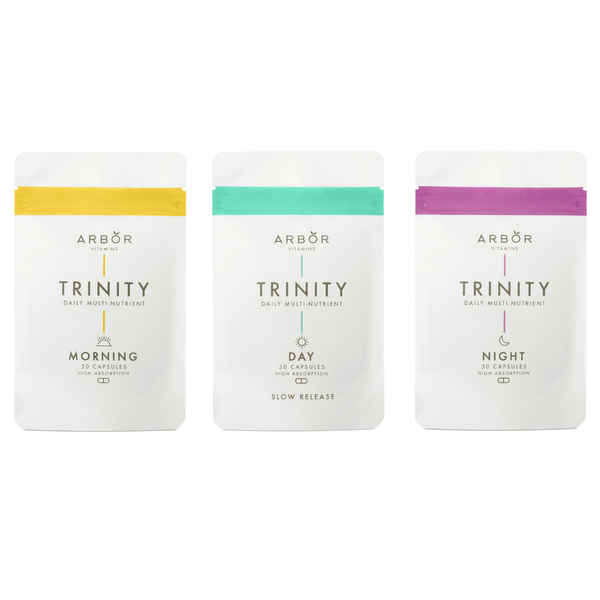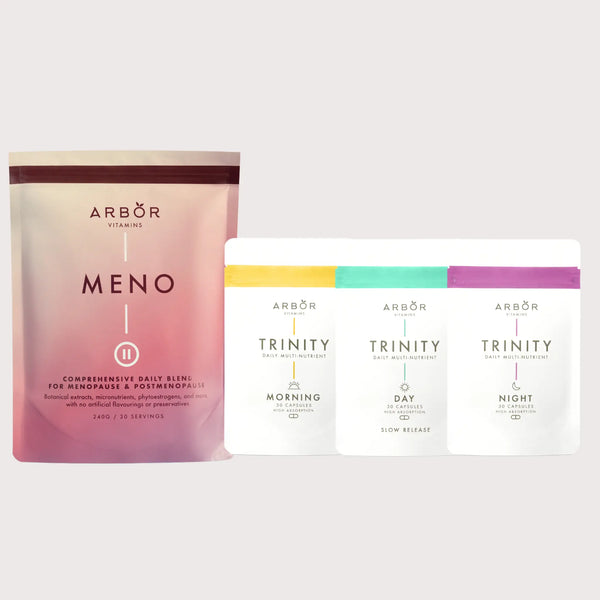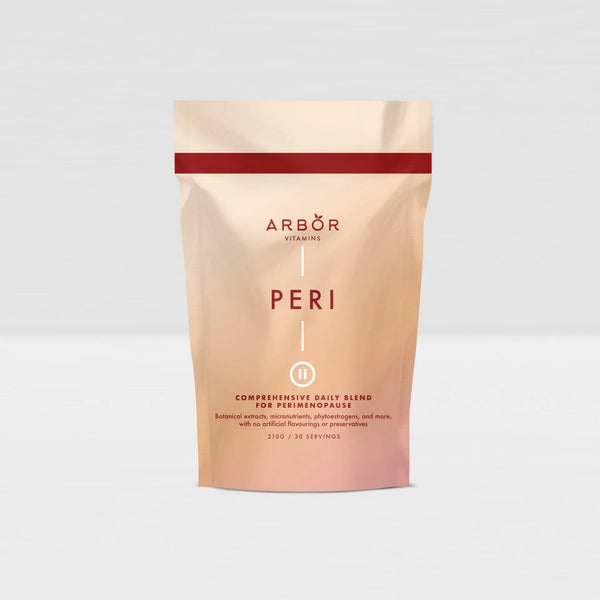As we move further into 2025, it’s clear that women’s health remains a dynamic and evolving field, with nutritional needs changing as our understanding of biology and wellness grows. From menstruation to menopause and beyond, women’s nutritional requirements evolve, making it essential to stay informed about the key vitamins and minerals that support overall well-being.
In 2025, certain nutrients have gained even more attention for their role in preventing deficiencies, supporting immunity, and improving mental and physical health. Here are the top five essential vitamins and minerals every woman should prioritise to thrive this year.
Choose Our Trinity Formula: For a complete, time-optimised multivitamin that supports overall wellness, the Trinity Formula delivers high-strength nutrients tailored for your daily needs.
1. Iron: A Vital Nutrient for Energy and Immunity
Iron continues to be one of the most critical nutrients for women in 2025, especially given its role in oxygen transport and energy production. Women with heavy menstrual cycles are still at a higher risk for iron deficiency anemia. Additionally, iron plays an essential part in supporting the immune system, which is crucial for staying healthy in today’s world.
Why It Matters in 2025: Studies show that iron deficiency is not just a concern for reproductive-aged women but also impacts older women who may experience blood loss through other medical conditions. Ensuring an adequate intake of iron helps maintain healthy energy levels and immune function (Percy et al., 2021).
2. Calcium & Vitamin D: Protecting Your Bones and Beyond

Calcium and Vitamin D remain the cornerstone of women’s bone health, especially as we age and during menopause. Calcium is critical for maintaining bone density, while Vitamin D helps with its absorption. In 2025, there’s increasing awareness of how these two nutrients also contribute to immune function and cardiovascular health.
Why It Matters in 2025:
Research continues to show that insufficient calcium intake is linked to an increased risk of osteoporosis and fractures, particularly in postmenopausal women (Weaver et al., 2020). Additionally, Vitamin D’s role in supporting a healthy immune system makes it especially vital in today’s climate of heightened focus on immune health.
3. Folate (Vitamin B9): Essential for Women’s Reproductive Health
Folate has long been known for its role in preventing neural tube defects during pregnancy. However, recent research highlights that it’s also crucial for cardiovascular health, mood regulation, and DNA synthesis. For women planning to conceive or currently pregnant, folate remains indispensable.
Why It Matters in 2025:
The demand for folate goes beyond pregnancy. As more research reveals the link between folate deficiency and various health conditions, its role in improving mental well-being and supporting heart health is increasingly recognised (Greenberg et al., 2021). Folate supplementation is recommended for women of reproductive age, not just for those pregnant or planning to become pregnant.
4. Omega-3 Fatty Acids: Supporting Brain Health and Reducing Inflammation

Omega-3 fatty acids, particularly DHA and EPA, have been shown to play a vital role in brain health, mood regulation, and inflammation reduction. In 2025, as stress levels and environmental toxins continue to impact mental and physical health, Omega-3s have gained even more attention for their ability to support cognitive function, mental clarity, and heart health.
Why It Matters in 2025:
Omega-3 fatty acids are essential for women, particularly during pregnancy for fetal brain development, but their importance extends to improving memory, reducing stress, and managing inflammation. Given the rise in mental health challenges globally, Omega-3 supplements are becoming a go-to nutrient for women seeking to optimize mental and emotional well-being (Kawabata et al., 2022).
5. Magnesium: A Natural Stress Reliever and Hormone Regulator

Magnesium plays an important role in over 300 enzymatic processes in the body, from muscle function to hormone balance. In 2025, magnesium is increasingly being recognized for its ability to alleviate symptoms of stress, anxiety, and PMS, helping women achieve balance during different life stages.
Why It Matters in 2025:
Stress management remains a top health concern for many women, and magnesium has emerged as a natural solution for promoting relaxation, improving sleep quality, and regulating hormones (Quaranta et al., 2021). It’s especially beneficial for women dealing with premenstrual symptoms, anxiety, or sleep disturbances.
Support your body during perimenopause and menopause with our PERI & MENO supplement, designed to help manage symptoms like mood swings and hot flashes with a blend of targeted amino acids.
Conclusion: Empowering Women’s Health in 2025
The science around women's nutrition is constantly evolving, and staying informed about the right vitamins and minerals is more important than ever. In 2025, the key nutrients that support overall well-being include iron, calcium, vitamin D, folate, Omega-3 fatty acids, and magnesium. These nutrients not only support physical health but also contribute to mental clarity, immune function, and stress relief, all essential for maintaining balance in a busy, modern world.
If you’re looking to optimise your health with high-quality, science-backed supplements, explore our range of products tailored to support women’s health. Always consult with a healthcare provider for personalised recommendations to meet your unique needs.
References
-
Percy, L., Mansour, D., & Fraser, I. (2021). Iron deficiency and iron deficiency anaemia in women. Best Practice & Research Clinical Obstetrics & Gynaecology, 40, 55-67.
-
Weaver, C. M., Alexander, D. D., Boushey, C. J., Dawson-Hughes, B., Lappe, J. M., LeBoff, M. S., ... & Wang, D. D. (2020). Calcium plus vitamin D supplementation and risk of fractures: an updated meta-analysis from the National Osteoporosis Foundation. Osteoporosis International, 27(1), 367-376.
-
Greenberg, J. A., Bell, S. J., & Guan, Y. (2021). Folic acid supplementation and pregnancy: More than just neural tube defect prevention. Reviews in Obstetrics & Gynecology, 4(2), 52.
-
Kawabata, T., Hirota, S., Hirayama, T., Adachi, N., Hagiwara, C., Iwama, N., ... & Kiso, Y. (2022). Age-related changes of dietary intake and blood eicosapentaenoic acid, docosahexaenoic acid, and arachidonic acid levels in Japanese men and women. Prostaglandins, Leukotrienes and Essential Fatty Acids, 86(4-5), 13-18.
-
Quaranta, S., Buscaglia, M. A., Meroni, M. G., Colombo, E., & Cella, S. (2021). Pilot study of the efficacy and safety of a modified-release magnesium 250 mg tablet (Sincromag®) for the treatment of premenstrual syndrome. Clinical Drug Investigation, 27(1), 51-58.


